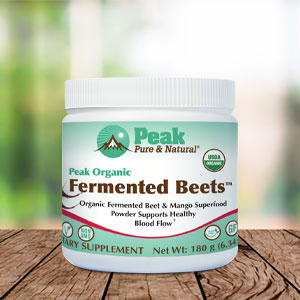Get Easy Health Digest™ in your inbox and don’t miss a thing when you subscribe today. Plus, get the free bonus report, Mother Nature’s Tips, Tricks and Remedies for Cholesterol, Blood Pressure & Blood Sugar as my way of saying welcome to the community!
The antioxidant that makes blood vessels 15 to 20 years younger

A bit of stiffening and narrowing in your blood vessels is considered a normal part of aging… it happens to pretty much everyone. Of course, some people are worse off…
An unhealthy lifestyle can cause atherosclerosis, a condition where your blood vessels accumulate a fatty buildup that makes them dangerously narrow, cuts off blood to your brain and/or heart, and puts you at a high risk for heart attacks and strokes.
Smoking, eating a poor diet and not exercising enough make it more likely that your blood vessels will end up in bad shape. And let’s face it… we’ve all been guilty of at least one of these less-than-healthy habits during our lifetime.
So, chances are, your blood vessels are showing the wear and tear of age… possibly even at a dangerous level. If only you had a time machine, so you could go back a few decades and take better care of them…
Well, a recent study may have uncovered the next best thing. It’s not a time machine, but it is a simple way to knock 15 to 20 years off those aging blood vessels and protect yourself from heart attacks and stroke…
CoQ10: A cure for aging blood vessels?
A new clinical trial from researchers at the University of Colorado Boulder found that an antioxidant called Coenzyme Q10 (CoQ10) can reverse age-related changes in blood vessels by 15 to 20 years in just six weeks.
The trial included 20 healthy men and women between the ages of 60 and 79. Half of them took a CoQ10 supplement called MitoQ for six weeks, and the other half took a placebo.
After six weeks, researchers looked at how well study participants’ blood vessels functioned by measuring how much their blood vessels dilated. Remember, dilated blood vessels mean wider blood vessels, which means better blood flow to your vital organs, and a lower risk of heart attack and stroke.
Then they took a two-week break, before swapping who got the CoQ10 and who got the placebo. Now, the former placebo group took the CoQ10 for six weeks, and the former CoQ10 group took the placebo for six weeks. Afterward, they checked on everyone’s blood vessels again.
After both six-week periods, researchers found that people taking the CoQ10 had healthier, more dilated blood vessels. In fact, people taking the supplement had blood vessels that were 42 percent more dilated… which made them look like the blood vessels of someone 15 to 20 years younger!
Researchers say this improvement in blood vessel health would be associated with a 13 percent lower risk of heart disease if study participants maintained it.
Why is this antioxidant so beneficial to blood vessels?
Well, according to researchers, a lot of the age-related changes in your blood vessels are caused by free radicals and oxidative stress — the same factors that contribute aging in your other body parts too. Since CoQ10 is an antioxidant, it can help fight free radicals and prevent or reverse some of this damage.
Should you get a CoQ10 supplement?
You may be tempted to head to the health food store and buy a CoQ10 supplement right away. But you should know that this clinical trial was small, so there’s no guarantee you’ll have the same results. That said, plenty of other studies have shown that CoQ10 is beneficial for your heart and blood pressure levels, which are closely connected to your blood vessel health.
In this study, people took 20 milligrams per day of a kind of CoQ10 called MitoQ. MitoQ was designed specially to make natural CoQ10 attach to the mitochondria in cells. Mitochondria are the powerhouses of your cells. As you get older, they produce more free radicals as they provide energy to your cells. Eventually, your body can’t keep up with all the free radicals that your mitochondria are producing, which leads to aging and disease. Targeting the mitochondria may be why the supplement was so successful in the study.
But there are certainly other CoQ10 supplements you can choose from. Just make sure whatever kind you get is made from ubiquinol, the natural form of CoQ10. That’s easier for your body to absorb than ubiquinone, the conventional form of CoQ10. You can also get some of your CoQ10 from foods like:
- Grass-fed beef
- Chicken
- Herring
- Peanuts
- Pistachios
- Broccoli
- Cauliflower
- Strawberries
- Oranges
Editor’s note: Have you heard of EDTA chelation therapy? It was developed originally to remove lead and other contaminants, including heavy metals, from the body. Its uses now run the gamut from varicose veins to circulation. Click here to discover Chelation: Natural Miracle for Protecting Your Heart and Enhancing Your Health!
- Aging changes in the heart and blood vessels — MedlinePlus. Retrieved April 24, 2018.
- What’s to know about atherosclerosis? — Medical News Today. Retrieved April 24, 2018.
- Novel antioxidant makes old blood vessels seem young again — MedicalXpress. Retrieved April 24, 2018.
- J. Rossman, et al. “Chronic Supplementation With a Mitochondrial Antioxidant (MitoQ) Improves Vascular Function in Healthy Older Adults.” — Hypertension, 2018.
- Is CoQ10 Found in Food? — The San Francisco Chronicle’s SFGate. Retrieved April 24, 2018.
- Coenzyme Q10 (CoQ10) — WholeHealth Chicago
- Coenzyme Q10 (CoQ10) — drweil.com














